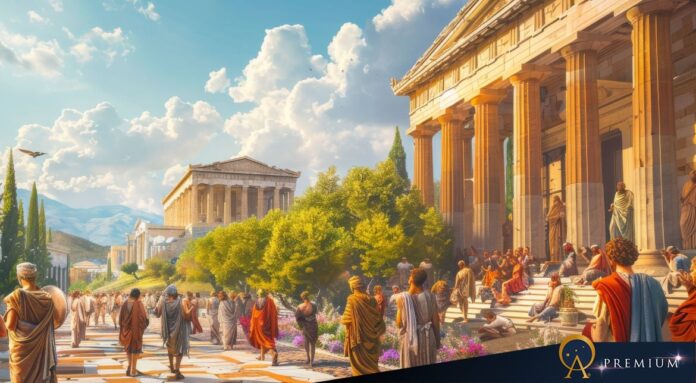In the society of Ancient Greece, the polis, or the city-state, was perhaps the most distinctive and important political innovation at the time. Emerging around the 8th century BC, this institution became the fundamental aspect of the ancient Greek civilization. Defining Greek life for centuries, the polis was not merely a city, but a distinct socio-political entity. Its emergence and development were closely connected with the traditional social structures of the time, the economy, and the landscape of Greece. And, as such, it shaped the development of Greek identity, politics, and culture. But more importantly, the polis laid the foundations for major political concepts that shaped the governance of the time, such as democracy, civic participation, and citizenship. What made the polis so successful and influential? And what was its ultimate fate?
The Emergence of the Polis
The earliest origins of the polis can be traced back to the aftermath of the era known as the Greek Dark Ages, which lasted roughly from 1100 to 750 BC. This was the period marked by the collapse of the venerable Mycenaean Civilization, which was followed by a major decline in population numbers and economic activities in the region. The ensuing dark ages saw communities largely isolated, scattered in remote parts of the landscape and having next to none political organization. But as centuries passed, things stabilized. By the 8th century BC, the society in Greece once more began to revitalize, and trade once again began to flourish. Populations grew, and more stable social structures and settlements were established.
Pericles gives a funeral oration in the ancient polis of Athens by Philipp von Foltz. (Public Domain)
There were several factors that brought about the emergence of the polis. There was, naturally, the geography of Greece, which dictated the emergence of large cities in certain parts of the land where life was guaranteed to thrive. The Greek mainland was always dominated by rugged terrain, and the large mountains and deep valleys divided the nation into isolated pockets and distinct regions. These geographical conditions discouraged the formation of large, centralized states but supported smaller, self-sufficient communities that could grow into independent city-states. Of course, there was the natural pace of socio-political evolution, as well as the rising need for collective security. The societies who lived together and enjoyed the security of formidable city walls were much better off than those living in small, scattered settlements at odds with their neighbors.
Top image: Ancient Greek agora scene. Source: AlexCaelus / Adobe Stock
By Aleksa Vučković





